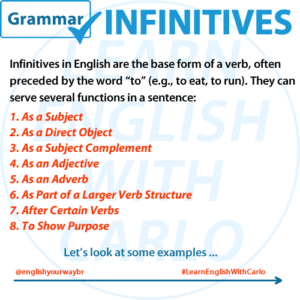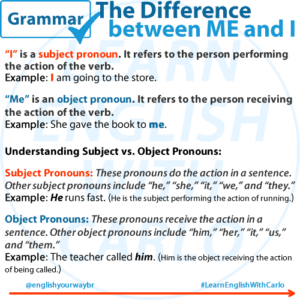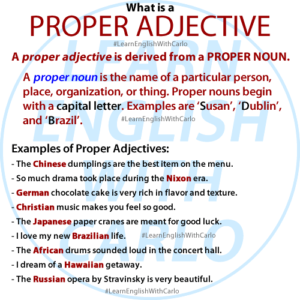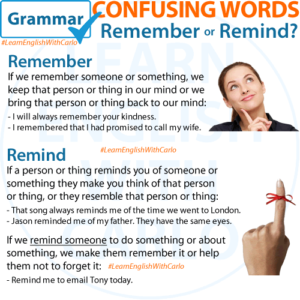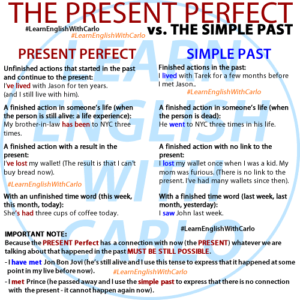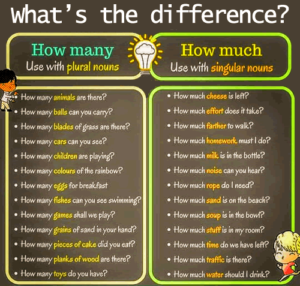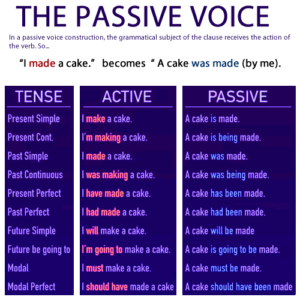Infinitives are the base form of a verb, usually preceded by “to” (e.g., to learn, to explore, to be). They’re incredibly versatile and are used in many ways to express purpose, intention, emotion, and more. In this guide, we’ll break down the main uses of infinitives in English grammar, with examples that will make it …
Category: INSTAGRAM
Images I've posted to Instagram
Permanent link to this article: https://englishyourway.com.br/infinitives-in-english/
Dec 04
I vs. ME – What’s the Difference?
One of the most common mistakes English learners (and even native speakers!) make is using “I” and “me” incorrectly. While they both refer to the same person — the speaker — they are used in different parts of a sentence. In this post, we’ll explain the difference and give you lots of examples so you …
Permanent link to this article: https://englishyourway.com.br/i-vs-me/
Dec 02
Giving Advice: SHOULD, OUGHT TO, and HAD BETTER
When giving advice in English, we often use the modal verbs “should,” “ought to,” and “had better.” Each of these has its nuances and specific contexts where they are more appropriate. Let’s explore how to use them, their differences, and how they work in questions and negative sentences. Using SHOULD “Should” is the most common …
Permanent link to this article: https://englishyourway.com.br/giving-advice-using-should-ought-to-had-better/
Nov 29
Understanding Proper Adjectives in English
In English, proper adjectives are derived from proper nouns, which name specific people, places, organizations, or things. What makes proper adjectives unique is that they always begin with a capital letter, just like the proper nouns they come from. These adjectives allow us to describe things with precision, linking the characteristics of a person, country, …
Permanent link to this article: https://englishyourway.com.br/understanding-proper-adjectives-in-english/
Nov 26
REMEMBER vs. REMIND
“Remember” is about your own memory, recalling information independently, while “remind” involves assisting or being prompted to recall something. If you remember something, it’s a natural act of memory. If something reminds you, it’s usually a trigger that brings a memory to your mind. REMEMBER: “Remember” is a verb that describes the ability to recall …
Permanent link to this article: https://englishyourway.com.br/remember-vs-remind/
Nov 24
The Present Perfect vs. The Simple Past
When learning English, one of the most challenging aspects for students is understanding the difference between the Present Perfect and the Simple Past. Both tenses refer to actions in the past, but they are used in very different ways depending on the context. Let’s break down these differences. Present Perfect: Unfinished Actions The Present Perfect …
Permanent link to this article: https://englishyourway.com.br/the-present-perfect-vs-the-simple-past/
Nov 23
SO-SO and MORE OR LESS: What’s the Difference
While SO-SO and MORE OR LESS are short and simple phrases, they serve entirely different purposes in English. Let’s dive into their meanings, uses, and nuances. 1. SO-SO: The Language of the Average Definition:SO-SO is used to describe something that is average, ordinary, or not impressive. It conveys a neutral feeling—not good, not bad. When …
Permanent link to this article: https://englishyourway.com.br/difference-between-so-so-and-more-or-less/
Nov 20
GRAMMAR – How Much vs. How Many
When we want to know the quantity or amount of something, we use HOW MUCH or HOW MANY. Key Differences: Remembering this distinction will help you use “how much” and “how many” correctly in questions and statements based on whether the noun is countable or uncountable. If you have any questions or doubts, please ask …
Permanent link to this article: https://englishyourway.com.br/difference-between-how-much-and-how-many/
Nov 19
Its vs. It’s – What’s the Difference?
English learners often get confused between “its” and “it’s” — and even native speakers make mistakes with these two! But don’t worry. Once you understand the difference, it’s easy to get it right every time. 🔤 Quick Explanation 🔎 When to Use “It’s” It’s is a contraction (short form) of: 📌 Examples with “it is”: …
Permanent link to this article: https://englishyourway.com.br/its-vs-its/
Nov 17
GRAMMAR – The Passive Voice
There are two voices in English (and most other languages), ACTIVE and PASSIVE. ACTIVE: Isabella ate the burrito.In this sentence, the subject, Isabella, performed the action, and the object, the burrito, suffered the action. To express something in the PASSIVE voice, the idea needs to have an OBJECT.Why? Because in the passive voice, the OBJECT …
Permanent link to this article: https://englishyourway.com.br/grammar-the-passive-voice/

